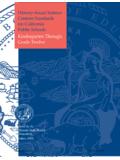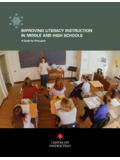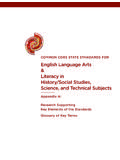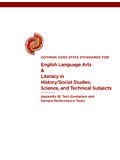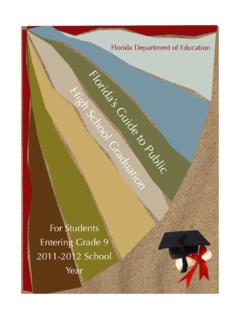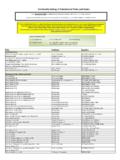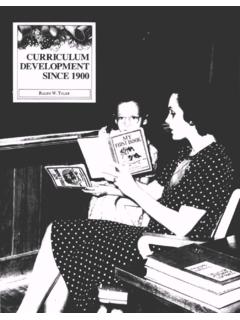Transcription of MERTON INTERNATIONAL SCHOOL
1 1 ACADEMIC STRUCTURE Forms 1 to 3 offer a pre-IGCSE programme in preparation for the IGCSE proper. The subjects include English, French, Literature, Geography, History, Mathematics, Biology, Chemistry, Physics, ICT, Physical Education and Art. In Form 4 when students embark on the two-year IGCSE course, these are the options open to them but MERTON offers the afore stated choices. Groups IGCSE Group 1 English and French (First Language, Second Language, Foreign Language, etc.) Group 2 Humanities and Social Science (Geography, English Literature, History, Economics etc.) Group 3 Sciences (Biology Chemistry Physics, etc) Group 4 Mathematics (Mathematics, Additional Mathematics, etc) Group 5 Creative, Technical and Vocational(ICT, Art and design, etc) A typical student s subject combination would be as follow: Group 1: English & French Group 2: Literature and History Group 3: Biology and Chemistry Group 4: Mathematics Group 5: ICT The SCHOOL aims for the prestigious ICE Certification which means that students would have to offer a minimum of seven (7) subjects from all the Subject-Groups, plus an additional language rather than a maximum of five-(5) subjects that leads to the award of an IGCSE certificate.
2 2 The competencies outlined by the CIE area clearly stated in their syllabi and the Departmental schemes and plans are derived from them. In Groups 3 and 4, candidates are expected to calculate, define and describe; investigate, judge and draw conclusions among other things. In Groups 1 and 2 the ability to select, organize and use information is particularly sought for as they are in Group 5. In addition to these core skills, the supplementary ones of analyses, syntheses and evaluation which ensure the much coveted grades of A*- C area what teaching will lead to. In the run up to subject choices by students at the beginning of Form 4, the IGCSE Coordinator will guide students through the selection process through explanations and reference to student precedents. Emphasis will be laid on future careers, our stated mission and students desire to explore other subjects. Please visit for further details on the IGCSE syllabi.
3 GRADE BANDS GRADE SCORE REMARK A* (90 100) EXCELLENT A (80- 89) VERY GOOD B ( 70- 79) GOOD C (60-69) PASS D (50-59) UNSATISFACTORY E ( 0-49) POOR STUDENT SUPPORT Remedial lessons come at no extra cost to the Parent. The decision to shore up a student will be evident from cumulated assessment and would be endorsed by all parties. Related to this, Parents are enjoined to communicate any challenges their wards may face especially by way of social adjustment. Concerns, depending on their nature, may be addressed to the class 3 teacher, the Principal or her Vice or the Headteacher. The stipulated times are before morning assembly and after 3pm. THE ADVANCE LEVEL PROGRAMME Progression to the Sixth Form College is not automatic for students who have written the IGCSE at MERTON . Students have to satisfy admission requirements including at least grade C in their chosen subjects, submission of transcripts covering the two previous years and a panel interview.
4 These will aid the process of helping the student choose subjects that fall in line with their goals and ability. PREPARATION FOR IGCSE/ A LEVEL Each year a strategy is drawn up for students in Form 5 and Upper 6. This strategy takes into account the individual strengths and challenges of the class with the view of surmounting them. The strategy for each year is different and tailored to the needs of the individual students. This strategic approach has led to very good results over the past three years. EXTRA CURRICULAR PROGRAMME The following clubs are available for High SCHOOL students; French club Science and technology club Global issues club In addition, parents may enrol their wards with after- SCHOOL clubs such as Tae Kwan Do, swimming and lawn tennis for a fee. Each year the High SCHOOL marks at least one United Nations commemorative day such as World Food Day and World Tourism Day.
5 Students also participate in a swimming gala in the First term and an inter- SCHOOL athletic competition in the second term. In the third term a Careers Fair is held to help students think through their chosen careers. Students are also required to contribute articles to the popular High SCHOOL annual magazine, the Harambee . 4 SCH00L TRIPS An exciting part of our SCHOOL calendar are our SCHOOL trips. High SCHOOL students have the opportunity to be part of up to 5 trips in a year. These include destinations in Ghana,West Africa and Europe. HOUSES Children from various classes are divided into Houses and supervised by a House Master and Mistress. Houses provide a basis for students across a spectrum of classes to engage in healthy competition. At present they are identified by their colours and take themselves on in sports and quizzes especially. GOVERNANCE The hierarchy which governs the SCHOOL consists of the Board of Governors, the CEO and the Vice Principal.
6 The Board is largely responsible for financial planning and the CEO, who shapes the vision of the SCHOOL , formulates and implements policy. She is ably assisted by her Vice Principal; who is in charge of the SCHOOL s day to day administration together with the Head teacher for the High SCHOOL . POLICIES AND PROCEDURES ADMISSIONS Admissions usually take place at the beginning of the year or in some cases mid stream if there is a vacancy however, it must be clearly stated that the SCHOOL administration reserves the right of admission. In both situations a form is filled out, and an entrance examination passed and a medical report presented. The recommended hospitals are: SSNIT, Ridge, Police and the 37 Military Hospitals. Admission into the High SCHOOL is based on passing an entrance examination. On admission it will be assumed that Parents have familiarised themselves with the rubrics and arrangements set out in this handbook.
7 5 TEXTBOOKS & STATIONERY Textbooks and exercise books are supplied by the SCHOOL . The textbooks which revert to the SCHOOL at the end of the academic year are the joint responsibility of Parents and Pupils. Exercise books and textbooks are supposed to be covered and Parents are asked to provide their wards with files for their handouts, pens pencils and the like. ACADEMIC CALENDER Revolving around Christian tradition, the Terms are divided into Advent, Lent and Trinity. The Academic Year is from September to June and the significant events include Harvest, Cultural Interaction Day and the Christmas Programme in the first term, Sports Day and in the second and Speech Day in the third term. Copies which detail events are usually available made from the office. PARENT TEACHER DAYS Curriculum Matters is a termly event where Parents are invited to a joint review of what their wards would be studying. The forum affords them the opportunity to query details and together, map the way forward for their children.
8 Open Day which takes place at the end of the term, affords a complete review of the term s work and may bring up issues of remedial help. At half term however, students who joined midstream may confer with the class teacher and the Principal on the child s progress. GRADUATION AND SPEECH DAY The Graduation and Prize Giving Day climaxes celebrations in the Trinity term. This day is used to recognize and award academic excellence and provides a platform for students to display their talents typifying the SCHOOL s mission. Students who are graduating are also recognised UNIFORM 6 Female students at the secondary level wear white short sleeved cotton shirts over grey pleated cotton skirts. Male students at the same level wear short sleeved cotton shirts over a grey pair of shorts. It is obligatory for male students to wear a white pairs of socks with flat heeled black leather shoes. Sneakers are worn only with the kit.
9 Students are expected to look smart all the time. Girls in the Sixth form wear a light blue shirt over a dark blue skirt while the boys also wear light blue shirts over a dark blue pair of trousers. CEREMONIAL WEAR In addition to the above, girls are expected to wear a bow tie for special functions. In the same vein boys would wear a white long sleeve shirt with the MERTON necktie. Instead of a pair of shorts, boys have to wear grey pair of trousers. Once a year, boys wear black or navy blue suits to SCHOOL .
